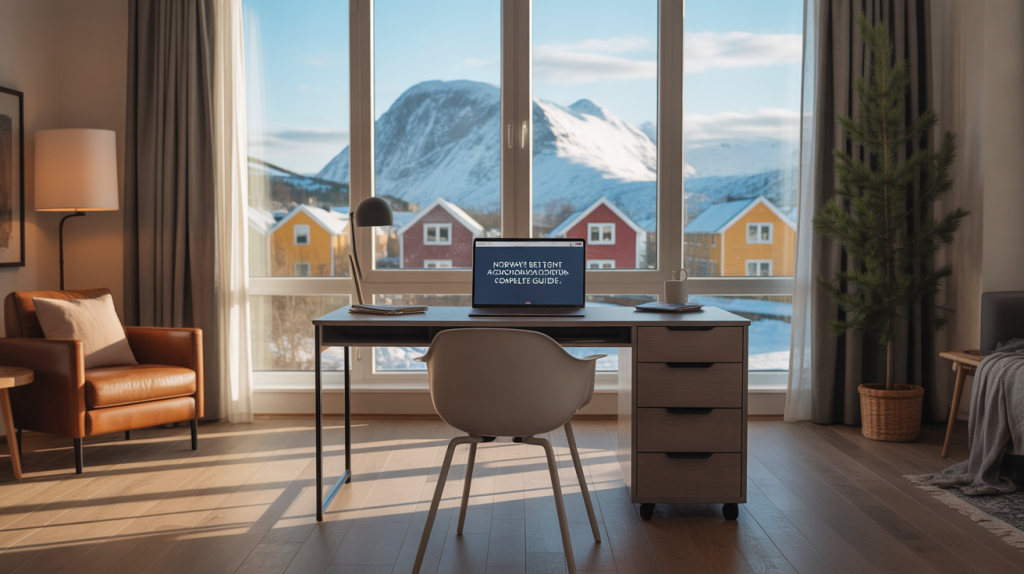Norway’s Best Student Accommodation Options: A Comprehensive Guide
Quick Navigation
- Types of Student Accommodation
- Key Features of Student Accommodation
- Costs and Affordability
- Application Process and Eligibility
- Choosing the Right Student Accommodation
- How to Secure Student Accommodation
- Final Tips for International Students
- Why Study in Norway Can Support Your Student Accommodation Needs
- Take the Next Step with Study in Norway
Types of Student Accommodation in Norway
Student Residences / Halls of Residence
The most popular choice among international students is student residences managed by student welfare organisations, such as SiO in Oslo or shared student housing providers in Bergen and Lillehammer. These halls typically offer:
- Single furnished rooms with either shared or private kitchen and bathroom facilities.
- Utilities and internet included in rent, simplifying monthly expenses.
- Convenient central locations close to campuses and city amenities.
- Opportunities for community involvement through social events organized within the residences.
Private Rental Market
For students who prefer more independence or cannot secure a place in student halls, the private rental market provides an alternative:
- Options range from private apartments to rooms in shared flats.
- Offers flexibility in location and living style, catering to diverse preferences.
- Generally higher rent costs than student residences; deposits and contracts are standard.
Homestay Arrangements
Homestays are less common but present unique opportunities for cultural immersion:
- Students live with a Norwegian host family, participating in family life and cultural exchange.
- Provides a home-like environment and language practice.
Key Features of Student Accommodation in Norway
Facilities and Amenities
Norwegian student residences typically include essential amenities important for student comfort and convenience:
- Free internet access to support academic and personal connectivity.
- Laundry facilities available on-site.
- Common social areas to promote interaction among students.
- Availability of kitchen equipment rental and storage spaces.
- Fully furnished rooms with a bed, desk, chair, table, and closet.
Types of Rooms
Accommodation options within student residences vary according to preferences and budgets:
- Single rooms with shared kitchen and bathroom facilities are common.
- Some residences offer studio apartments with private kitchens and bathrooms for greater privacy.
- In rarer cases, shared rooms may be available, often at a lower price point.
Costs and Affordability
Generally, student housing in Norway is more affordable than private rentals. Rent for a single room in a student residence typically ranges around 4,400 NOK (approximately 410 EUR) per month. Prices vary depending on the city and type of accommodation, with Oslo and Bergen typically on the higher end.
Student welfare organisations include utilities in rent, helping students manage their budget without unexpected expenses.
Application Process and Eligibility
- Apply early: Student housing is in high demand, so it is crucial to submit applications as soon as you receive your admission offer.
- Eligibility: Exchange students staying for a full semester are normally eligible to apply for campus accommodation. Short-term or shorter stays may need to consider private market alternatives.
- University student welfare organisations provide official application portals and guidelines.
Choosing the Right Student Accommodation
Location Considerations
When selecting accommodation, proximity to your university and city amenities is a key factor:
- Many students choose to live in city centres for easy access to cultural life, shopping, and entertainment.
- Others prefer residences near their campus, prioritizing convenience for commuting and academic engagement.
Community and Social Life
Living in student residences offers unmatched opportunities to:
- Engage with international and Norwegian students.
- Participate in organized social events and networking opportunities.
- Access services and support through the student welfare organisations.
How to Secure Student Accommodation in Norway
Through Student Welfare Organisations
Student welfare organisations are the primary providers of affordable and secure student housing. Their key advantages:
- Manage multiple housing locations with varied amenities.
- Provide transparent information on facilities, rent, and terms.
- Offer support and advice throughout the application and move-in process.
Navigating the Private Rental Market
If student residences are full or do not meet your needs, turning to the private rental market is essential:
- Search early due to high demand and limited supply.
- Prepare for a higher cost structure and the need for deposits.
- Be vigilant about rental agreements and verify the legitimacy of landlords and agencies.
Final Tips for International Students
- Start your housing application as soon as you receive your acceptance letter.
- Compare different accommodation types and locations to find the best fit for you.
- Contact your university’s housing office or student welfare organisation for assistance.
- Plan your budget carefully, accounting for rent, utilities, and living expenses.
- Join international student groups and forums to receive peer advice on housing and settling in Norway.
Why Study in Norway Can Support Your Student Accommodation Needs
At Study in Norway, we specialize in helping international students make their educational dreams a reality, including finding the right accommodation. Our platform connects students with universities and services that streamline the admission and housing processes.
By partnering with Study in Norway, international recruiters, university admissions teams, and student placement agencies can leverage our expertise to guide students through:
- Comprehensive pre-arrival information on accommodation options.
- Reliable networks with student welfare organisations and private housing providers.
Take the Next Step with Study in Norway
Explore further and make your study journey in Norway easier:

